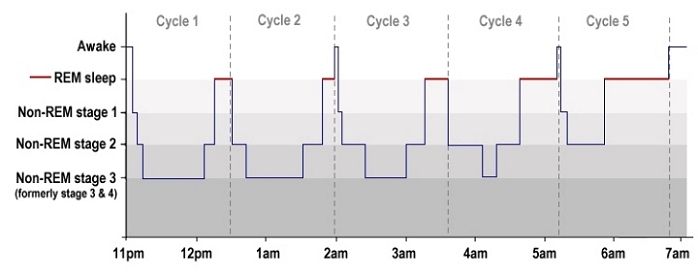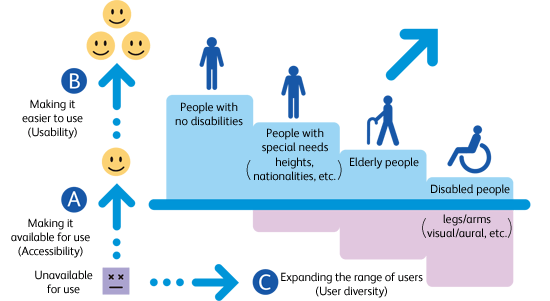Traits of covert narcissism
Signs, Causes and How to Respond
A covert narcissist has narcissistic personality disorder (NPD) but does not display a sense of self-importance often associated with the condition. They may deal with insecurity and low self-esteem.
The term “narcissist” gets thrown around a lot. It’s often used as a catch-all to describe people with any traits of narcissistic personality disorder (NPD).
These people might seem self-centered or so focused on their own importance that they’ve lost touch with reality. Or maybe they don’t appear to care about others and rely on manipulation to get what they want.
In reality, NPD isn’t that simple. It occurs on a broad spectrum that involves a range of potential traits. Experts generally agree that there are two distinct subtypes. One of these is covert narcissism, also called vulnerable narcissism.
NPD is typically divided into two subtypes, including overt (grandiose) and covert narcissism.
While both types share many similarities, including a lack of empathy, an inflated sense of self-importance, and a need for admiration, the way that each type presents outwardly can differ.
In particular, people with overt narcissism are generally more extroverted and are often described as bold and charming. However, they can also become combative and confrontational when challenged.
On the other hand, though people with covert (or vulnerable) narcissism are just as self-absorbed, they are typically perceived as more introverted, self-conscious, and insecure.
Covert narcissism usually involves fewer external signs of “classic” NPD. People still meet the criteria for diagnosis but have traits that aren’t usually associated with narcissism, including:
- shyness and introversion
- self-consciousness
- insecurity
- defensiveness
- sensitivity to what others think of them
The following signs may also point to covert narcissism. Keep in mind that only a qualified mental health professional can diagnose a mental health condition.
If you’ve noticed these traits in a loved one, encourage them to seek support from a therapist trained to help people with personality disorders.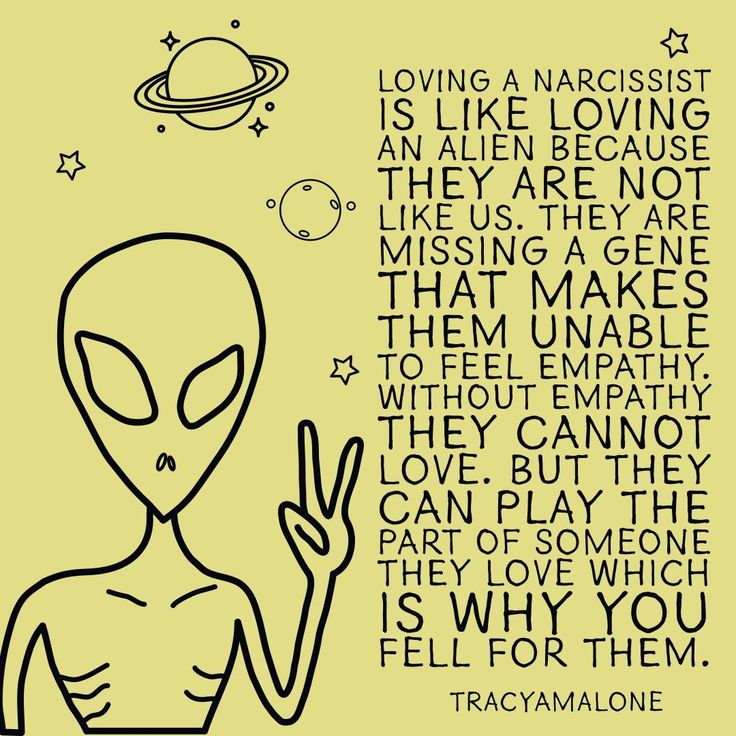
High sensitivity to criticism
NPD typically involves insecurity and an easily damaged sense of self-esteem. This can manifest in covert narcissism as extreme sensitivity to criticism.
This sensitivity isn’t unique to NPD, of course. Most people don’t love criticism, even constructive criticism. But paying attention to how someone responds to real or perceived criticism can offer more insight into whether you’re looking at narcissistic sensitivity.
People with covert narcissism might make dismissive or sarcastic remarks and act as if they’re above the criticism. But internally, they might feel empty, humiliated, or enraged.
Criticism is a threat because it constitutes evidence that the person’s negative view of themselves may actually be true. When they receive a critique instead of admiration, they can take it pretty hard.
Passive aggression
Most people have probably used this manipulation tactic at one time or another, possibly without realizing it. But people with covert narcissism often use passive-aggressive behavior to convey frustration or make themselves look superior.
But people with covert narcissism often use passive-aggressive behavior to convey frustration or make themselves look superior.
Two main reasons drive this behavior:
- the deep-seated belief their “specialness” entitles them to get what they want
- the desire to get back at people who wronged them or had greater success
Passive-aggressive behavior can involve:
- sabotaging someone’s work or friendships
- teasing or mocking remarks framed as jokes
- silent treatment
- subtle blame-shifting that makes other people feel bad or question what really happened
- procrastinating on tasks they consider beneath them
A tendency to put themselves down
A need for admiration is a key trait of NPD. This need often leads people to boast about their achievements, often by exaggerating or outright lying.
Maury Joseph, PsyD, suggests this may be related to internal self-esteem issues.
People with covert narcissism “have to spend a lot of time making sure they don’t feel bad feelings, that they don’t feel imperfect or ashamed or limited or small,” he explains.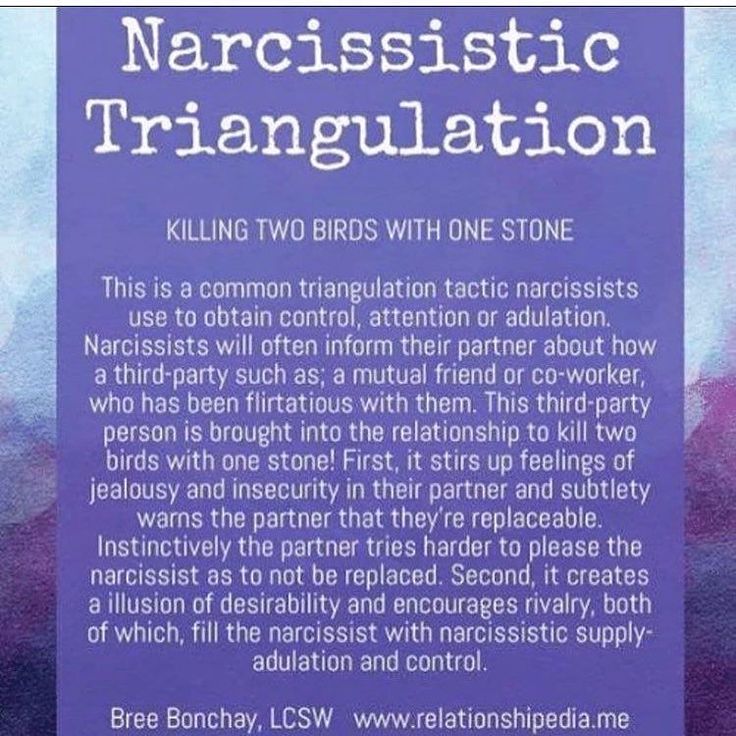
People with covert narcissism also rely on others to build up their self-esteem. They react strongly to any perceived criticism that confirms their negative sense of self.
They might speak modestly about their contributions with an underlying goal of earning compliments and recognition. Or they may offer a compliment to get one in return.
A shy or withdrawn nature
Covert narcissism is more strongly linked to introversion than other types of narcissism.
This relates to narcissistic insecurity. People with covert NPD are deeply afraid of having their flaws or failures seen by others. Exposing their innermost feelings of inferiority would shatter the illusion of their superiority. Avoiding social interactions helps lower the chances of exposure.
People with covert narcissism may also avoid social situations or relationships that lack clear benefits. They simultaneously feel superior and tend to distrust others.
Research from 2015 also points out that managing the distress associated with NPD can be emotionally draining, leaving little energy for developing meaningful relationships.
Grandiose fantasies
People with covert narcissism generally spend more time thinking about their abilities and achievements than talking about them. They might seem smug or have an “I’ll show you” attitude.
“They may withdraw into fantasy, into an inner narrative world that’s not equivalent to reality, where they have inflated importance, powers, or a specialness that is opposite of what their actual life is like,” Joseph says.
Fantasies could involve:
- being recognized for their talents and promoted at work
- being admired for their attractiveness everywhere they go
- receiving praise for saving people from a disaster
Feelings of depression, anxiety, and emptiness
Covert narcissism involves a higher risk of co-occurring depression and anxiety than other types of narcissism.
There are two major reasons for this:
- Fear of failure or exposure may contribute to anxiety.
- Frustration over-idealized expectations not matching up with real life, and the inability to get needed appreciation from others can trigger feelings of resentment and depression.

Feelings of emptiness and thoughts of suicide are also associated with covert narcissism.
“People under deep pressure to be pleasing and likable to themselves have to go to great lengths to keep that up and preserve their self-esteem. Failing to keep up that illusion involves the bad feelings that come with the reality of failure,” Joseph says.
A tendency to hold grudges
Someone with covert narcissism may hold grudges for a long time.
When they believe someone’s treated them unfairly, they might feel furious but say nothing at the moment. Instead, they’re more likely to wait for an ideal opportunity to make the other person look bad or get revenge in some way.
This revenge might be subtle or passive-aggressive. For example, they might start a rumor or sabotage the person’s work.
They may also hold grudges against people who earn the praise or recognition they think they’re entitled to, such as a co-worker who receives a well-deserved promotion.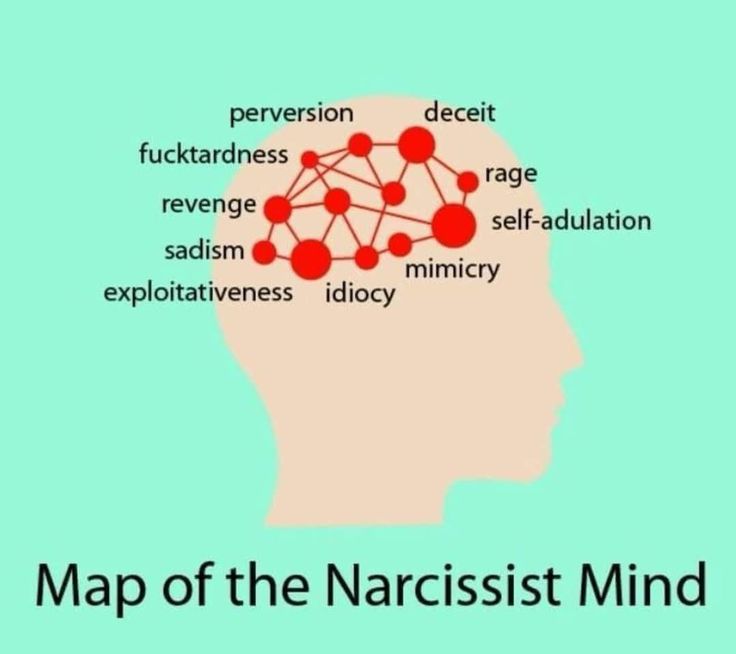
These grudges can lead to bitterness, resentment, and a desire for revenge.
Envy
People with either grandiose narcissism or NPD often envy other people who have things they feel they deserve, including wealth, power, or status. They also often believe others envy them because they’re special and superior.
People with covert narcissism may not outwardly discuss these feelings of envy, but they might express bitterness or resentment when they don’t get what they believe they deserve.
Feelings of inadequacy
When people with covert narcissism can’t measure up to the “superhuman” standards they set for themselves, they may feel inadequate in response to this failure.
These feelings of inadequacy can trigger:
- shame
- anger
- a sense of powerlessness
Joseph suggests this is based on projection.
People with NPD have unrealistic standards for themselves, so they unconsciously assume other people also hold them to these standards.
To live up to them, they’d have to be superhuman. When they realize they are, in fact, just human, they feel ashamed of this “failure.”
Self-serving ‘empathy’
Contrary to popular belief, it’s possible for people with NPD to at least show empathy. But they spend so much time trying to build up their self-esteem and establish their importance that this often gets in the way, according to Joseph.
People with covert narcissism, in particular, may seem to have empathy for others. They might seem willing to help others out or take on extra work.
You might see them performing an act of kindness or compassion, such as giving money and food to someone sleeping on the street or offering their spare bedroom to a family member who was evicted.
But they generally do these things to win the approval of others. If they don’t receive praise or admiration for their sacrifice, they may feel bitter and resentful and make remarks about how people take advantage and don’t appreciate them.
While the causes of covert narcissism are not well-understood, research suggests that narcissistic personality disorder may develop due to a combination of factors, including:
- genetics
- early relationships with caregivers and relatives
One research study found that people with covert narcissism may have had more authoritarian parents and may, more frequently, recall instances of childhood trauma and abuse than those who have grandiose narcissism.
However, other research does not support the relationship between childhood abuse or trauma and the development of covert narcissism. More research may be needed in this area.
Certain personality traits are also more common in people with narcissistic personality disorder, such as aggression, reduced tolerance to stress, and difficulty regulating emotions.
Whether it’s a friend, family member, co-worker, or significant other, maintaining any type of personal relationship with a covert narcissist can be challenging.
Here are a few tips for how to deal with a covert narcissist:
- Learn more. Understanding the signs of covert narcissism can make it easier to decide when it may be time to seek support, distance yourself, or end the relationship altogether.
- Set healthy boundaries. Because many people with NPD lack clear boundaries, it’s essential to reinforce yours by setting realistic limitations and taking space from the relationship as needed.
- Avoid feeling offended. While it may be easier said than done, it’s important to avoid taking things personally. Recognize that any hurtful comments or passive-aggressive remarks are not about you, and then don’t react or engage.
- Build a strong support system. Seek support from friends and family members, who can offer a fresh perspective and help you recognize when you’re being manipulated.
Narcissism is more complex than it’s made out to be in pop culture.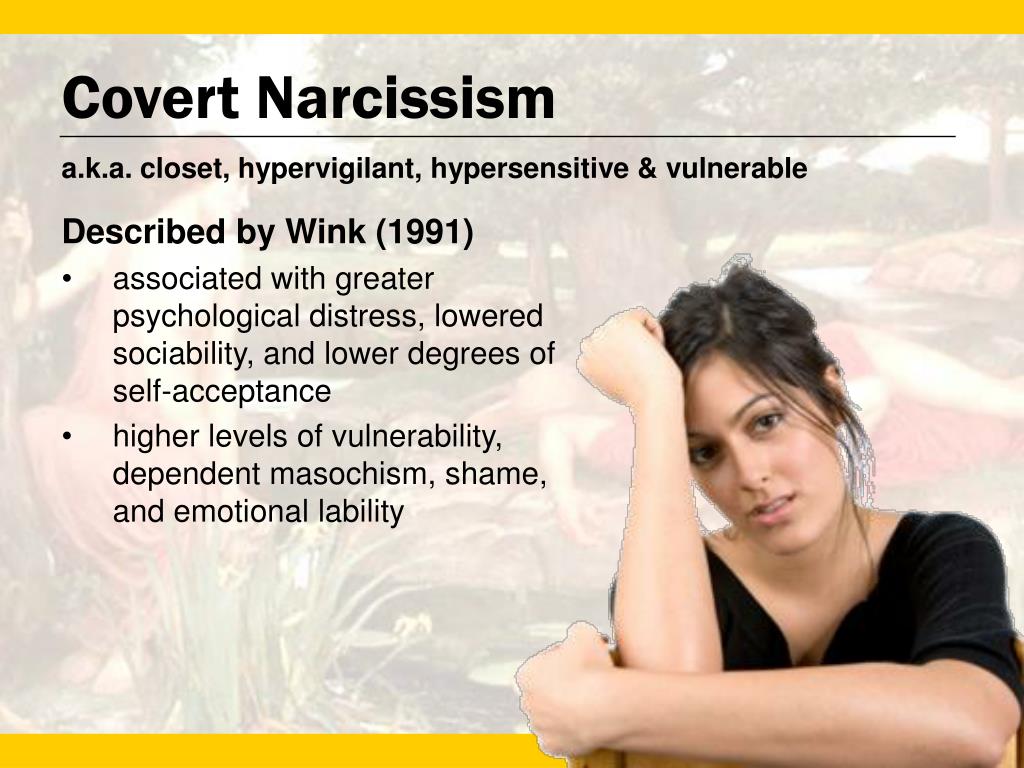 While people with narcissistic tendencies might seem like bad apples that should be avoided, Joseph points out the importance of having sensitivity to narcissistic dynamics.
While people with narcissistic tendencies might seem like bad apples that should be avoided, Joseph points out the importance of having sensitivity to narcissistic dynamics.
“Everyone has them. We all want to basically feel OK in our own eyes. We’re all under pressure to be like our ideals, to make ourselves into a certain image, and we do all sorts of things to create the illusion that we’re fine, including lying to ourselves and others,” he says.
Some people have an easier time than others with regulating these feelings and emotions. Those who struggle with them may be more likely to develop NPD or another personality disorder.
If someone you know has signs of NPD, make sure to take care of yourself, too. Look out for signs of abuse and work with a therapist who can offer guidance and support.
Here you’ll find answers to some common questions on covert narcissism.
What do covert narcissists do in relationships?
People with covert narcissism often use several tactics to gain control over others in a relationship. This includes gaslighting, manipulation, passive-aggressive behavior, and intimidation.
This includes gaslighting, manipulation, passive-aggressive behavior, and intimidation.
What are things that covert narcissists may say?
Covert narcissists may make dismissive remarks that will make you feel like your feelings or opinions do not matter. They may interrupt or take over a conversation, or conversely, they may give you the silent treatment if something is not happening the way that they want. Some examples of statements you might hear include: “I was just kidding,” “you’re too sensitive,” “you’re crazy,” or “you’re not making any sense.”
Is covert narcissism more common in males or females?
Research shows that females tend to exhibit features of covert narcissism more often than males. This may be related, in part, to the fact that modern culture places a high value on female physical appearance. As such, females tend to internalize a profound sense of insecurity and shame about their perceived inability to live up to social expectations of beauty.
Crystal Raypole has previously worked as a writer and editor for GoodTherapy. Her fields of interest include Asian languages and literature, Japanese translation, cooking, natural sciences, sex positivity, and mental health. In particular, she’s committed to helping decrease the stigma around mental health issues.
How to spot the signs of a covert narcissist
At some point or another, most of us have heard the term narcissism or read an article somewhere that illustrates the classic narcissistic traits of someone diagnosed with a narcissistic personality disorder.
The word narcissist has become a widely used term among many communities in recent decades, and no longer gets restricted to the mental health community or those who work with clients with mental health issues.
Covert narcissists
Narcissism is associated with many personality traits, most of them superfluous, such as:
- Superficial charm
- Attention-seeking
- Lack of reliability
- Manipulation
- The propensity to break peoples’ boundaries
- Inflated sense of self-importance and self-centered
- An exaggerated sense of self
As helpful as it is for people to understand the psychological profile of a typical narcissist, much research has gone into understanding the introverted narcissist, too, those who do not display the classic signs of a narcissist as outlined above.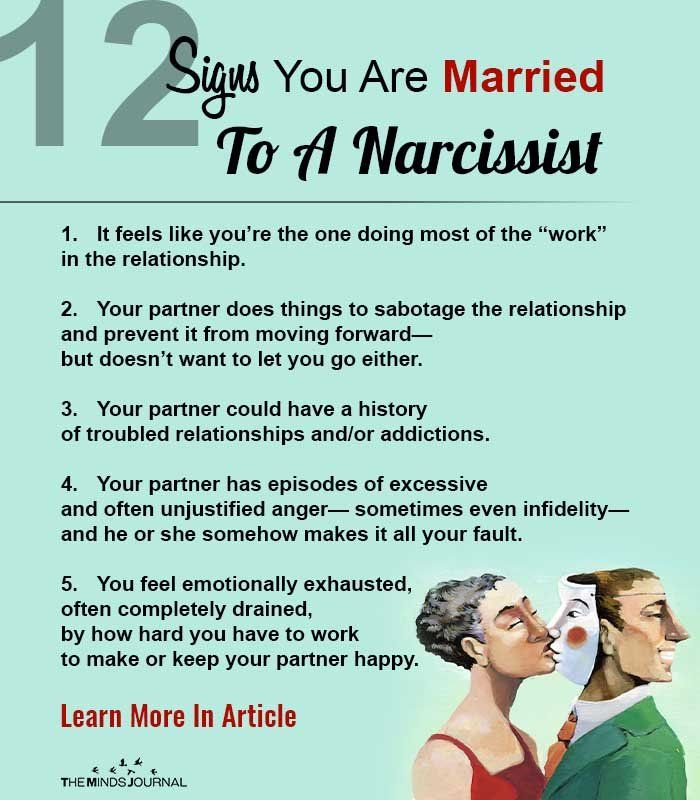
Covert narcissism
Researchers have identified four subtypes associated with the introverted narcissist:
- Covert narcissism
- The hypersensitive narcissist
- The vulnerable narcissist
- The closet narcissist
Signs of covert narcissism
People with covert narcissism tend to display very different personality traits to those with the classic variation of narcissism.
Instead of the extroverted characteristics such as attention-seeking and blatant manipulation, covert narcissism manifests as:
- Impolite yawns
- Eye rolls
- Sighs
- Strong sensitivity to criticism
- Withdrawing and dismissing other people
- Withdrawn self-centeredness
- Extreme sensitivity
Although this subtype of narcissism tends to be largely hidden, closet narcissists uphold the same conceit and negative connotations as classical narcissism.
Moreover, because of their nature, these types of mental disorders often present many clinical challenges.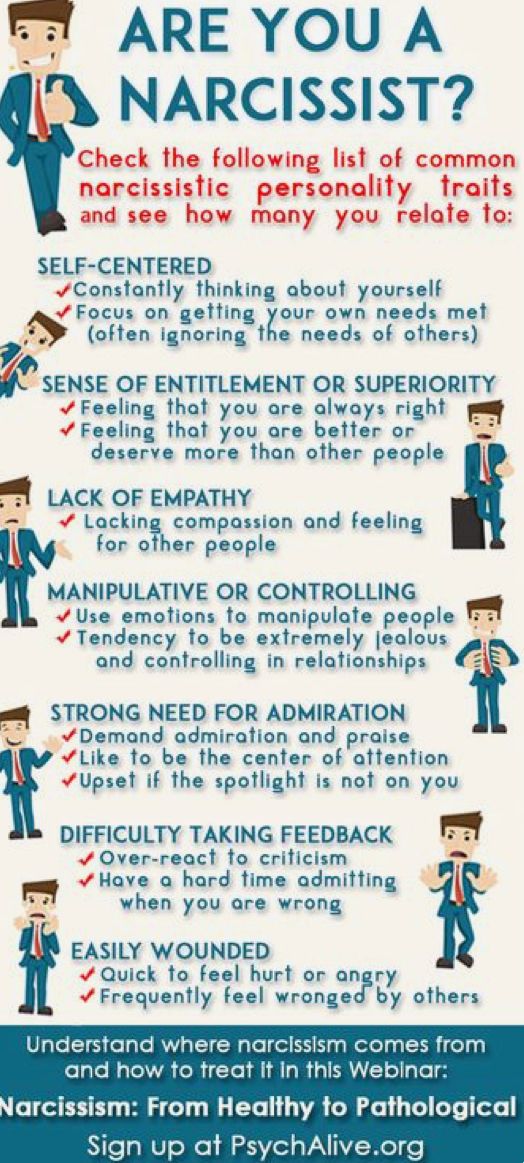
Vulnerable narcissism
It must be pointed out that not all introverts are narcissists, just like all extroverts aren’t.
However, those who possess the classical traits of a closet narcissist tend to create a quiet tension with those around them, leaving others feeling off balance and uncomfortable.
Overt narcissists v’s Covert narcissists
Overt and covert narcissists share some common ground in how they do things, both usually exhibiting an external veneer of superiority over others, all to cover up their low self-esteem and vulnerability.
An overt narcissist tends to convey the message that they are ”better than everyone else.” In contrast, covert narcissists are slightly more subtle with their boasting, but the subtext is always there.
Narcissistic personality
Narcissism shows up differently within each individual.
Some people may inhabit a few narcissistic traits now and then.
But, at the same time, others tend to be more pathological and habitually reside in their narcissistic persona while being utterly clueless about their behaviour and how it impacts those around them.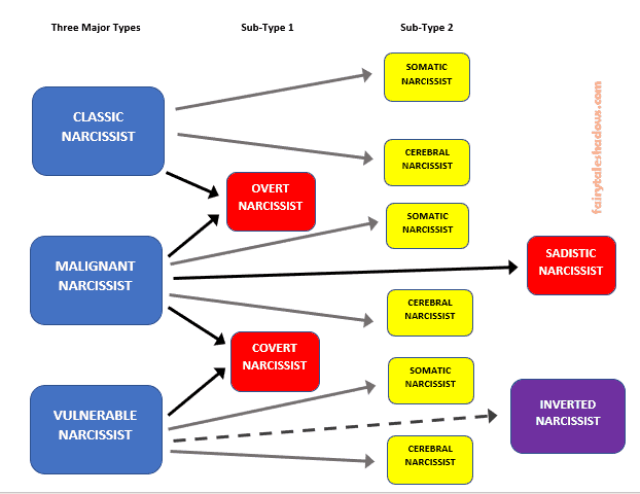
Telltale signs
Some of the more profound telltale signs of closet narcissism get outlined below:
#1. Lack of empathy
Empathy or a lack thereof is a typical personality trait of narcissistic personality disorder for overt and covert types. Narcissists are often dismissive of other people’s feelings and are often oblivious of the impact of this.
A classical line from a narcissist is usually something like,” You’re stressed out and bogged down with work? But I thought you were driving me to the theatre?
Even when friends or family members convey their frustrations to the narcissist and how their actions and attitudes affect them, this can often make the situation worse as the narcissist will somehow spin it around and make it about themselves.
#2. Silent superiority and complacency
Unlike the glorious fanfare typically observed in their narcissistic counterparts, covert narcissists are the quiet counterpart and often present themselves in markedly different ways to those around them.
Passive-aggressive behavior
In many ways, covert narcissists are more challenging to spot than those who scream self-importance.
They tend to observe their surroundings with quiet scrutiny and judgement and listen apathetically rather than offering anything substantial to the conversation.
The byproduct of this type of narcissism tends to manifest as being lukewarm in sentiment. The covert narcissist often appears calm and detached and frequently displays unsettling non-verbal cues.
#3. Self-absorbed behaviors
Another common trait of closet narcissists is their quiet, self-centeredness.
Although most introverts are good listeners and are capable of contributing to a conversation equally, you’ll find that people high in covert narcissism are often derisive, poor listeners.
They are quick to convey frustration.
Covert narcissists jump into a conversation with an often unfair assessment about a person or situation only to quickly find the topic boring, uninteresting and unworthy of their attention.
You might also find that people with covert narcissism often deploy stonewalling techniques such as blocking you out whenever you are speaking or trying to make a point, or they may listen to you but half-heartedly.
#4. Extremely sensitive
Almost every one of us feels slighted at some point during our lives. However, the difference between a narcissist and the rest of the world is their excessive sensitivity.
Covert narcissists tend to get combative and offended at the smallest slight or perceived criticism.
When receiving constructive criticism, closet narcissists tend to go into fight or flight mode – they will defend themselves with an increased smugness or dismissal, or they may withdraw entirely from the conversation with a quiet sullenness.
#5. Challenging relationships
Broadly, narcissists tend to have a difficult time holding down relationships in general, whether it be with a family member, friends or a romantic pairing, narcissists of all kinds struggle to create and sustain genuine, long-term relationships.
In covert narcissism, the calm exterior and smugness often serves as a protective barrier to the rest of the world and is often a defence mechanism to keep others at a distance.
Essentially, the covert narcissist’s underlying goal is to conceal their inadequacies and feelings of low worth from other people.
Diagnostic and clinical challenges
Due to its nature and the lack of empirical research compared to other narcissistic types, covert narcissism has presented some challenges in both clinical and research areas.
Narcissistic Personality Disorder (NPD) is common and highly comorbid with other mental health disorders; the condition also gets associated with significant psychosocial ability and functional impairment.
Diagnostic and statistical manual
One of the biggest challenges is the lack of research regarding narcissism; for mental health specialists, this has created much confusion, a lack of reliability, validity and sensitivity regarding the diagnostic criteria of the disorder.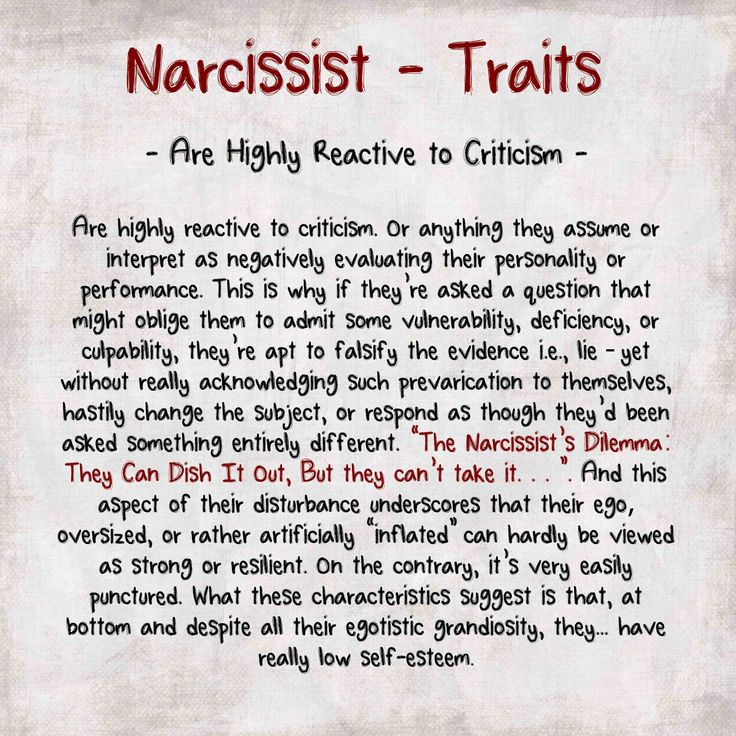
There have been no randomized trials with regards to any of the subtypes of Narcissistic Personality Disorder. Because of the lack of literature and research, narcissism got eliminated from the Diagnostic Statistical Manual.
Fortunately, this decision was overturned, and consequently, Narcissistic Personality Disorder got included in section II of the Diagnostic Statistical Manual – edition five.
Treatment
Treatment for Narcissistic Personality Disorder is usually psychotherapy (talk therapy). In some cases, medication may get prescribed if you have other co-occurring mental health conditions.
Contact us
If you or someone you know has any of the symptoms mentioned in this article, perhaps it’s time to get in touch with a professional who will help you work through any self-limiting feelings, allowing you to live a happier, more fulfilling life.
Fiona Yassin is International Family Director at The Wave Clinic in Kuala Lumpur. Fiona works closely with her colleagues in London and Dubai to advise parents and family offices on global treatment options. Fiona is a registered UK Psychotherapist and Clinical Supervisor (License Number #361609), EMDR Trained (EMDRIA registration number #100054651), a fellow of ACCPH and a Senior Accredited Addiction Professional.
Fiona is a registered UK Psychotherapist and Clinical Supervisor (License Number #361609), EMDR Trained (EMDRIA registration number #100054651), a fellow of ACCPH and a Senior Accredited Addiction Professional.
Fiona is also a trauma-focused mental health professional, specialising in Eating Disorders and Borderline Personality Disorder. CBT-E (Oxford), FREED (King’s College), Clinical Supervisor (UNCG), Post Grad Neuroscience (Tennessee), a member of IAEDP and The Association of Child Protection Professionals, and has a baby Maine Coon called Dave.
signs, causes and how to respond
Recognizing a person with covert narcissism is not an easy task. We tell you what signs indicate this type of personality and how to properly interact with such people.
Valeria Skripko
Freepik
Sometimes we can recognize a daffodil right away. This is usually the one who is in the spotlight, for example, loudly tells incredible stories about his achievements, thereby arousing a sense of admiration in others.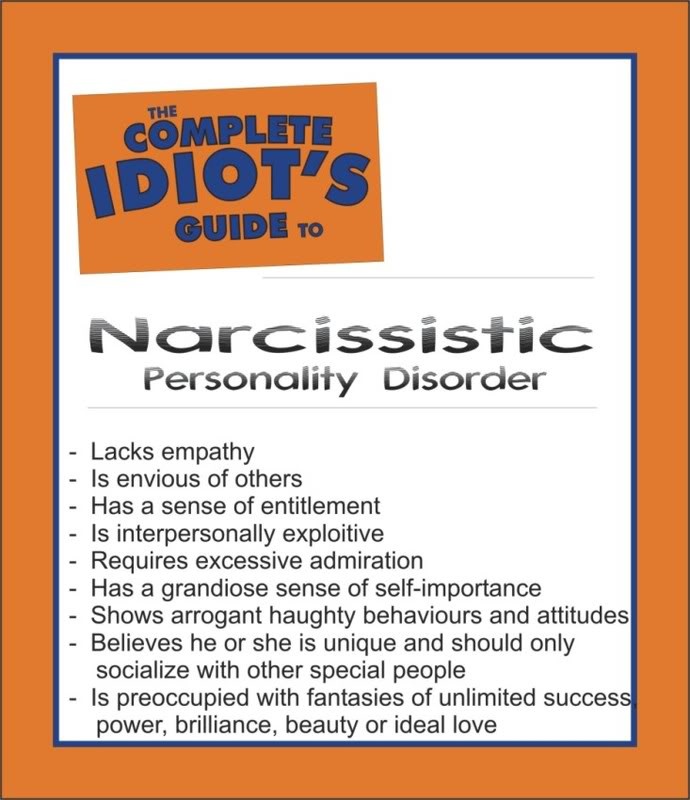 And can we meet people within the same room who are obsessed with their importance, but in whom it is not so easy to discern a narcissist? Yes, in fact, this is another narcissistic personality type, only with less obvious characteristics.
And can we meet people within the same room who are obsessed with their importance, but in whom it is not so easy to discern a narcissist? Yes, in fact, this is another narcissistic personality type, only with less obvious characteristics.
Contents of the article
Narcissistic personality traits
The term "narcissist" is often used to describe those people who seem to us to be a little self-centered. However, from a clinical psychology point of view, a person must meet certain criteria to be diagnosed with narcissistic personality disorder.
Common narcissistic traits include
- a sense of self-importance,
- fantasy of popularity and fame,
- exaggeration of one's abilities, talents and achievements,
- craving for attention and recognition,
- manipulating people and lack of empathy,
- preoccupation with beauty, power or success.
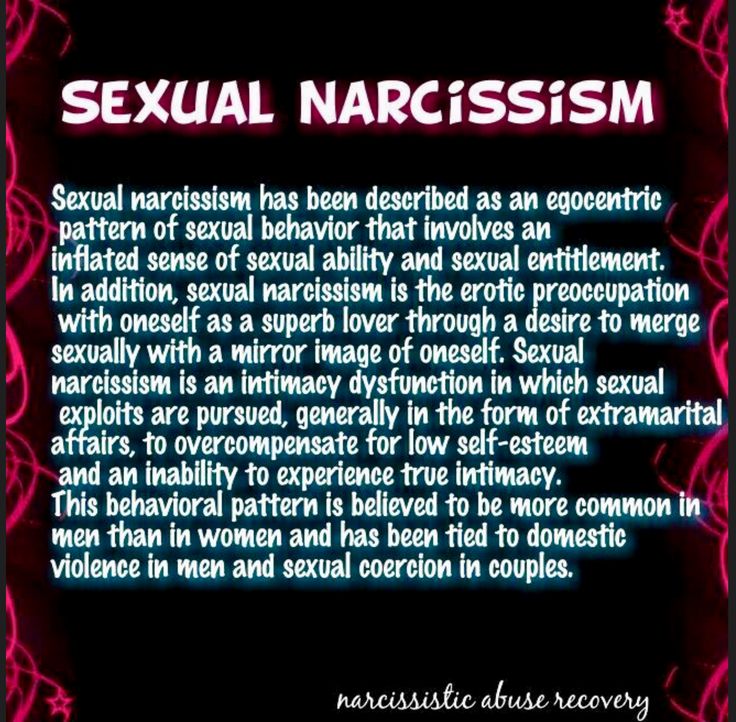
In general, people with narcissistic personality disorder are concerned about their own success. They also find it difficult to build or maintain relationships with others due to their manipulative behavior and lack of empathy.
Who is a covert narcissist?
A covert narcissist is one who craves admiration and attention and does not feel empathy for others, but may act differently than an overt narcissist. Analyzing the behavior of narcissists, it is difficult to imagine that any of them can suppress their nature. The covert narcissist appears modest or withdrawn in appearance, but his ultimate goals are the same as those of everyone else.
Causes of covert narcissism
The exact causes of covert narcissism are not entirely clear, but it is likely that a number of circumstances contribute to this condition. Experts suggest that narcissistic personality disorder is due to factors such as:
- genetics,
- childhood abuse and trauma,
- parenting and relationships,
- personality and temperament.

One study found that people with narcissistic personality disorder were more likely to grow up with parents who were highly focused on social status and achievement. Future narcissists felt their superiority over other children and considered themselves special, and all this carried over into adulthood. However, it is still unclear why narcissistic behavior is sometimes hidden rather than open.
Differences between open and covert narcissism
Covert narcissists differ from others only in that they tend to be more introverted. An open narcissist is easy to recognize: they tend to be loud, arrogant, indifferent to the needs of others, and always crave compliments. Such a person exhibits more extraverted behavior when interacting with people.
However, both covert and open narcissists have a sense of self-importance and dream of success and fame. In addition, each of them is unable to regulate their self-esteem.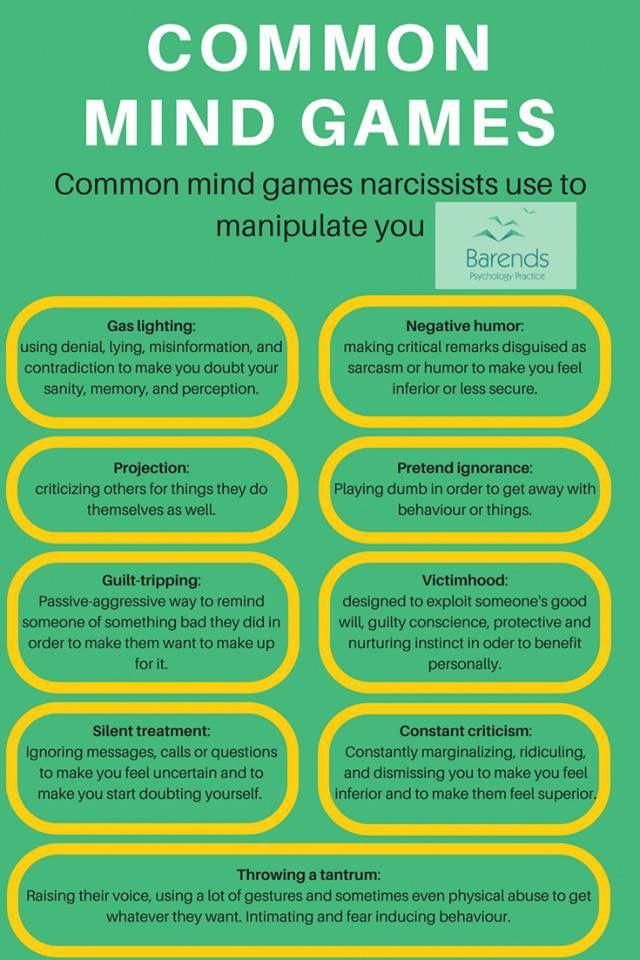
Signs of a covert narcissist
Here are some common traits and behavioral patterns that will help you recognize a covert narcissist in everyday life.
Low self-esteem
If an extroverted narcissist does not hide an inflated sense of self-esteem and an arrogant attitude towards others, then everything is not so obvious with a hidden narcissist. The latter, of course, craves attention and admiration, but in the eyes of others it may look different. Such individuals make ambiguous compliments and deliberately downplay their achievements or talents so that people will convince them otherwise.
An open narcissist will attract attention, while a hidden narcissist will use softer tactics to achieve the same goals. He needs people to praise his talent, skills, and accomplishments.
Blame and shame
Blame is a tactic used by narcissists to secure their high position.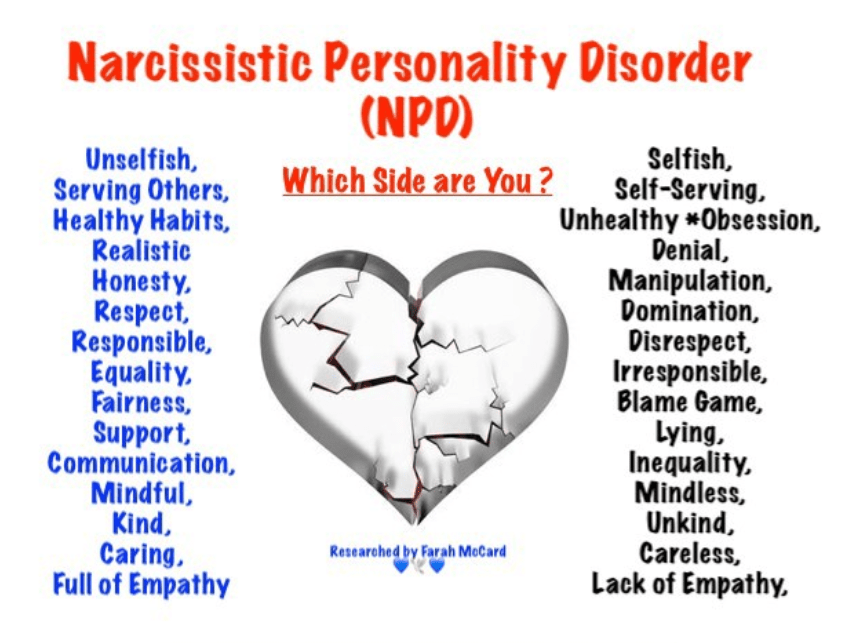 An open narcissist will take a more obvious approach to gaining leverage, such as belittling and criticizing you, being rude and sarcastic. The introverted narcissist, in turn, will calmly explain why you are to blame for something, and not him. This type of person may even pretend to be a victim or emotionally abuse themselves in order to get support and praise from you. Their main goal is to make the other person feel worthless.
An open narcissist will take a more obvious approach to gaining leverage, such as belittling and criticizing you, being rude and sarcastic. The introverted narcissist, in turn, will calmly explain why you are to blame for something, and not him. This type of person may even pretend to be a victim or emotionally abuse themselves in order to get support and praise from you. Their main goal is to make the other person feel worthless.
Creating confusion
Some covert narcissists enjoy being confused by others. They may not blame or shame anyone, but they will make you doubt yourself. Covert narcissists use similar tactics to elevate themselves and maintain power over people. If they make you doubt yourself, it becomes easier for them to manipulate you.
Neglect
Covert narcissists will do everything to make the whole world revolve around them. It is no coincidence that they tend to gravitate toward caring and compassionate people.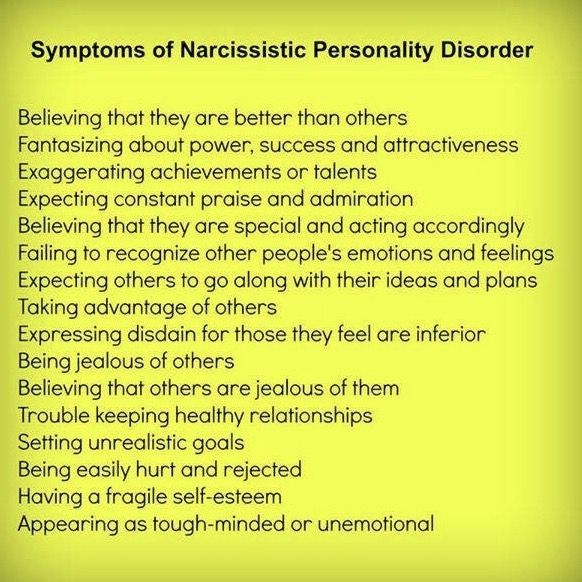 The covert narcissist sees this as an opportunity for manipulation.
The covert narcissist sees this as an opportunity for manipulation.
Instead of directly telling you that you are not important to them, they may ask you out, respond to messages at the last minute, always be late, or never make clear plans at all. They show no respect for your time or interests, so you start to feel small and vulnerable.
Pursuit of specific goals
Narcissists find it difficult to invest energy in something that does not bring them any benefit. Covert narcissists present everything in such a way that you feel like they are helping, but this behavior is shown with the intention of getting something in return.
Emotional indifference
Narcissists are unable to build and maintain emotional bonds with others. And the covert narcissist is no exception. While they may seem kinder and less obnoxious than their extrovert counterparts, they are not emotionally available or responsive.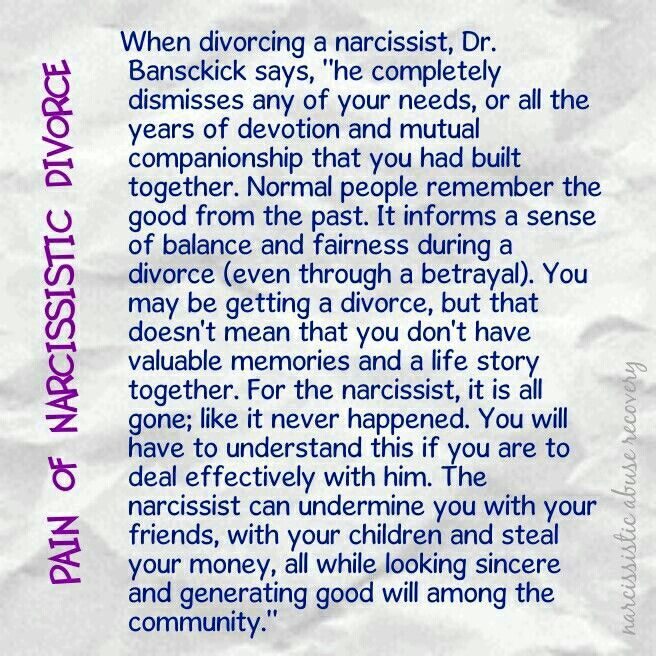
Most likely, they will not bestow flattering words on you. Covert narcissists are always focused on staying on top of themselves in order to maintain their sense of self-importance, so it will be difficult for them to compliment someone. Usually, narcissists don't pay attention to anyone's abilities or talents at all.
Although covert narcissists appear to be more emotionally available, they tend to only pretend and do so in order to make the other person feel worthless due to neglect, blame, or shame. Because lack of empathy is a hallmark of narcissistic personality disorder, the covert narcissist will not respond emotionally to their partner in a healthy way.
How to Deal With a Covert Narcissist
You may already be in a relationship with a covert narcissist, whether it be a family member, co-worker, or someone else. Although you cannot control their actions, you can manage your behavior and interact differently with such people.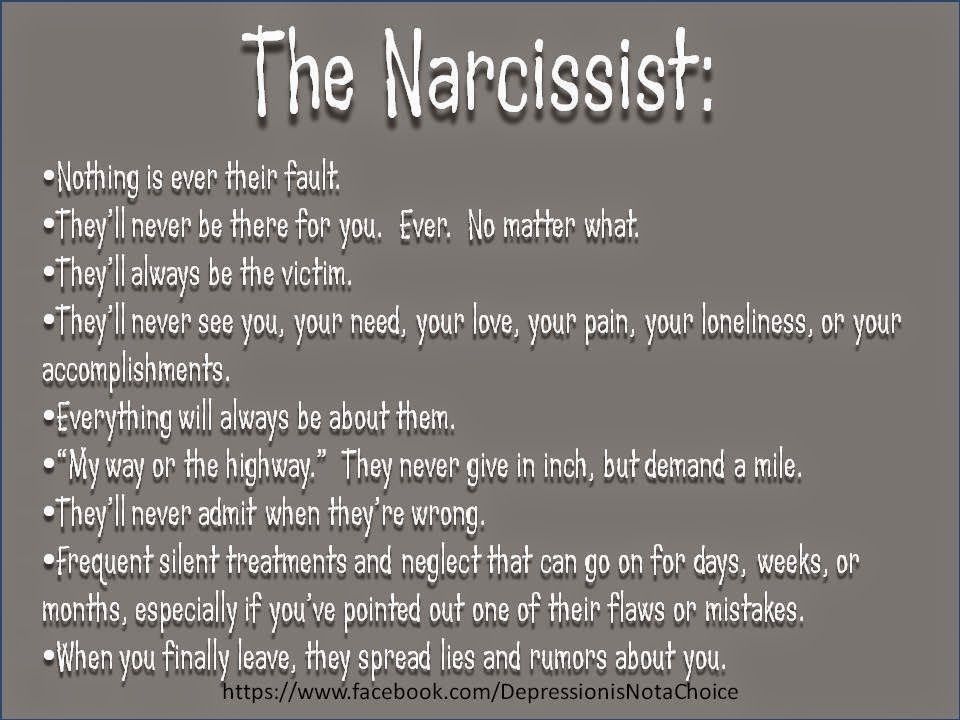 Here are a few steps you can take to protect yourself when dealing with a closet narcissist.
Here are a few steps you can take to protect yourself when dealing with a closet narcissist.
Don't take it personally
No matter how painful the covert narcissist's manipulative behavior may be for you, it's important to remember that it has nothing to do with you. Narcissists want you to take it personally because that's how they maintain leverage.
Set boundaries
Narcissists don't have healthy boundaries. Because covert narcissists lack empathy, they exploit others, and personal boundaries are what can get in the way of their goals. The more you practice setting boundaries with the narcissist, the sooner you will be able to convey that his tactics are not working.
Setting boundaries can be very difficult. Remember that this is just a way to communicate your values to others. Understanding why you set certain boundaries will help you be more confident and stay on track if someone tries to violate or ignore them.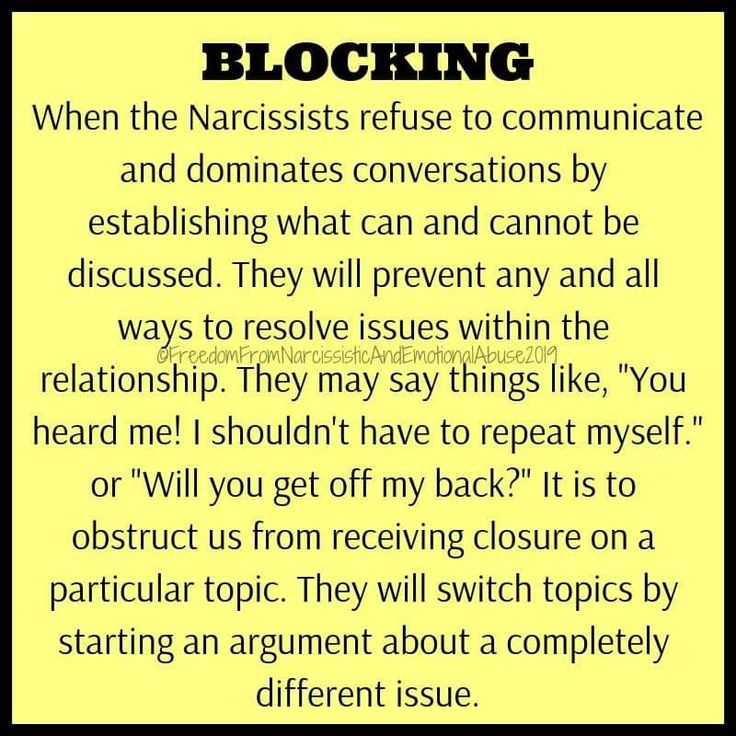
Protect Yourself
It's easy to lose your voice when dealing with a covert narcissist. Since interaction patterns are too manipulative, it may take you a while to realize that you are not protecting yourself at all.
Define your values and goals. Strengthening your relationship with yourself is the key to interacting with a narcissist. When you start to defend yourself, the narcissist realizes that you know about their tactics, which may cause him to retreat.
Create a healthy distance
Relationships with a covert narcissist can be frustrating and overwhelming. There are times when creating distance between you and that person seems impossible, such as with a family member or colleague.
Restricting face-to-face contact, asking to be moved to another location in your office, taking breaks at different times, or simply ending interactions is a solution if you are suffering from someone's narcissism.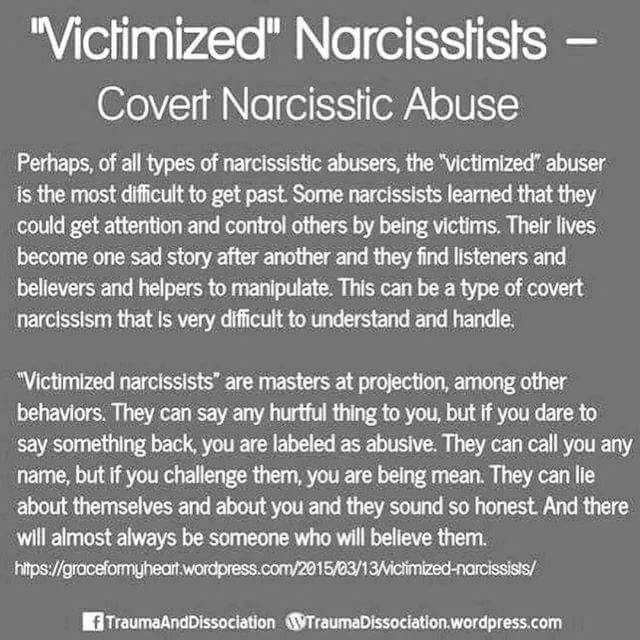 The purpose of creating distance is not to harm the other person, but to protect yourself.
The purpose of creating distance is not to harm the other person, but to protect yourself.
Are there hidden daffodils among your acquaintances?
Source
How to recognize a person with covert narcissism
Although some clinical criteria must be met for a diagnosis of narcissistic personality disorder, there are some generalized personality traits and behavior patterns to look out for in individual relationships if you suspect that you are dealing with a hidden narcissist.
Information about these signs will be helpful to those dealing with a covert narcissist, as they will be able to recognize potentially unhealthy relationships and better understand them.
Passive assertion of self-importance
While the more overt, extroverted narcissist will openly display a sense of self-importance and arrogance in relation to others, it may not be easy to spot the covert narcissist.
He definitely wants to show his importance and be admired, but to those around him, it may look different.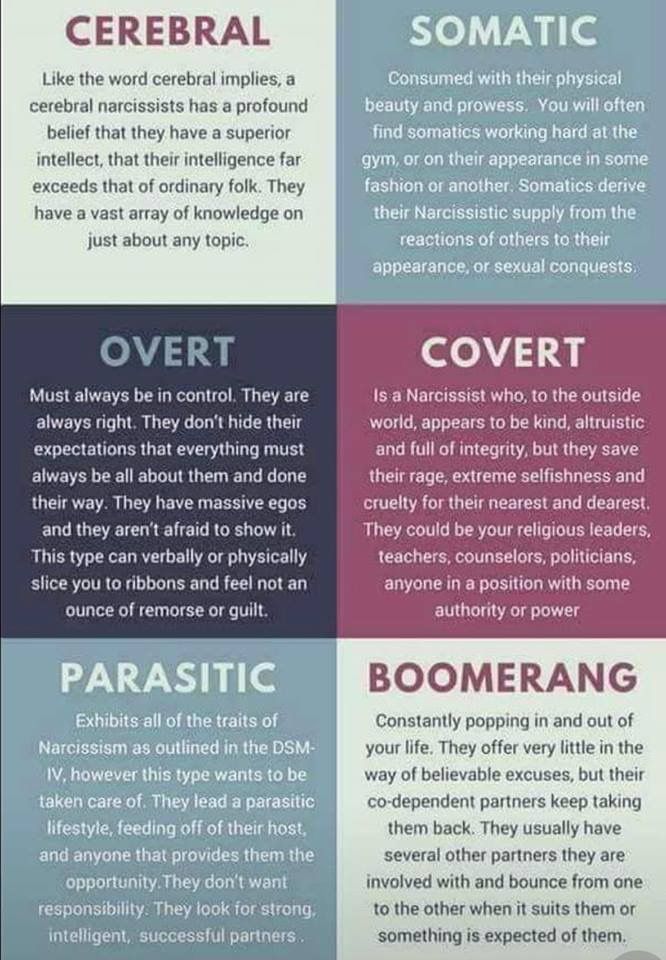 Such a person may release ambiguous compliments or purposefully downplay his talents and achievements so that other people object to him and tell him how talented he really is.
Such a person may release ambiguous compliments or purposefully downplay his talents and achievements so that other people object to him and tell him how talented he really is.
It is true for both overt and covert narcissists that they have a fragile sense of self.
The overt narcissist will demand admiration and attention, while the covert narcissist will use softer tactics to achieve the same goals. The covert narcissist is more likely to constantly seek approval for his talents, skills, and accomplishments in order for other people to feed his sense of self-importance.
Blaming and blaming
Shaming others is a great tactic for the narcissist to put himself above others. An overt (extroverted) narcissist may seek to put himself above others in more obvious ways, such as openly belittling you, criticizing you, speaking rudely, or using sarcasm.
An introverted, covert narcissist can explain more gently why it is you who are to blame for something, and not him.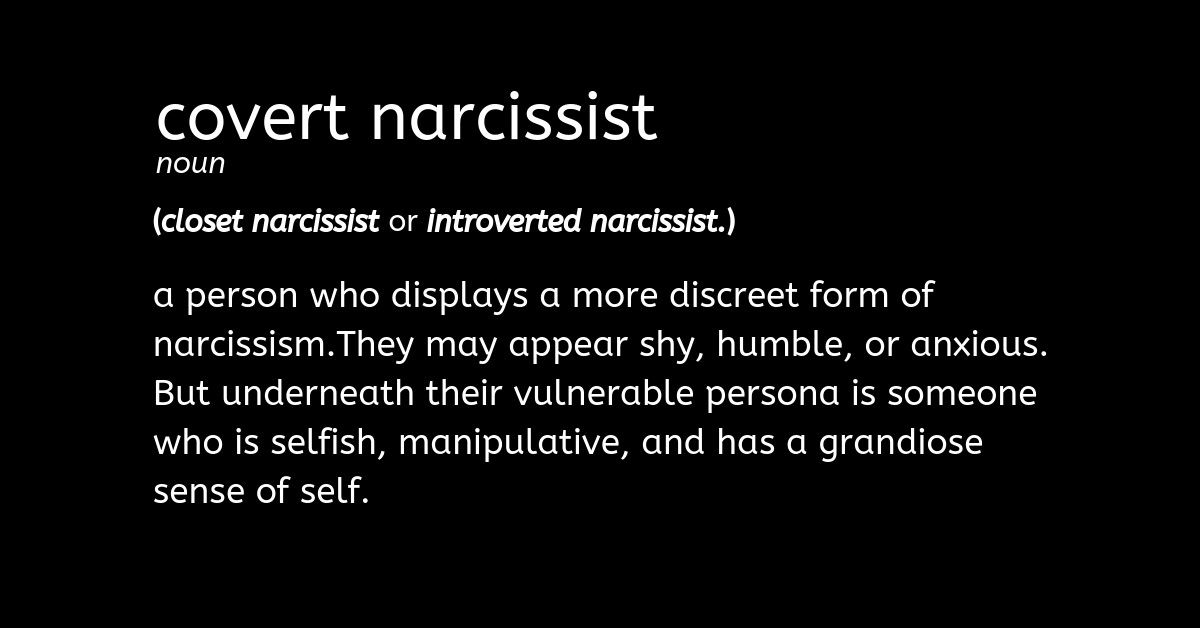 He may even pretend to be the victim of your behavior or use emotional abuse to put you in a position to receive encouragement and praise from you. Ultimately, the narcissist's goal is to make other people feel worthless.
He may even pretend to be the victim of your behavior or use emotional abuse to put you in a position to receive encouragement and praise from you. Ultimately, the narcissist's goal is to make other people feel worthless.
Confusing
Although covert narcissists do not always operate in secret, some of them take pleasure in confusing those with whom they interact. They may not try to blame or shame them. But instead, they will make people question their own perceptions and their own opinions.
For covert narcissists, this tactic is another way to influence other people. They can use it to elevate themselves and dominate relationships. If such a person makes you doubt how you feel, it will enable him to more successfully exploit and manipulate you.
Procrastination and neglect
Since the covert narcissist is dominated by the need to prove his own importance, he is ready to do anything to draw attention to himself. So while an extroverted narcissist will just rudely push you aside or manipulate you to get his way, the covert narcissist is adept at pretending not to notice you.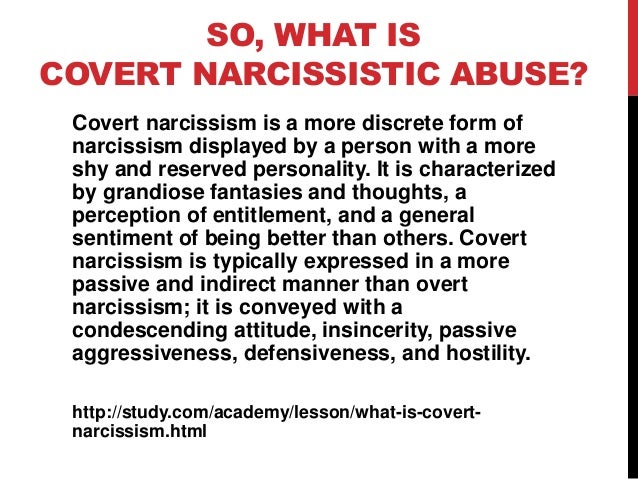
It is no coincidence that narcissists in general gravitate towards interactions with caring and compassionate people. The covert narcissist is also great at recognizing these opportunities for manipulation.
He will easily let you know that you don't matter.
But instead of directly telling you that you don't matter, he may make you wait until you make a date, only respond to messages and emails at the last minute, always be late for events you attend, or do not agree with your plans at all. He does not value your time and interests, making you feel unimportant, unimportant and out of place.
Neglect of emotions
Narcissists are practically unable to build and maintain emotional bonds with others. How do they know how to build relationships if their energy is always focused on themselves? Covert daffodils are no different. So while they may seem more good-natured and not as obnoxious as their overt "cousins," they are just as incapable of emotional response.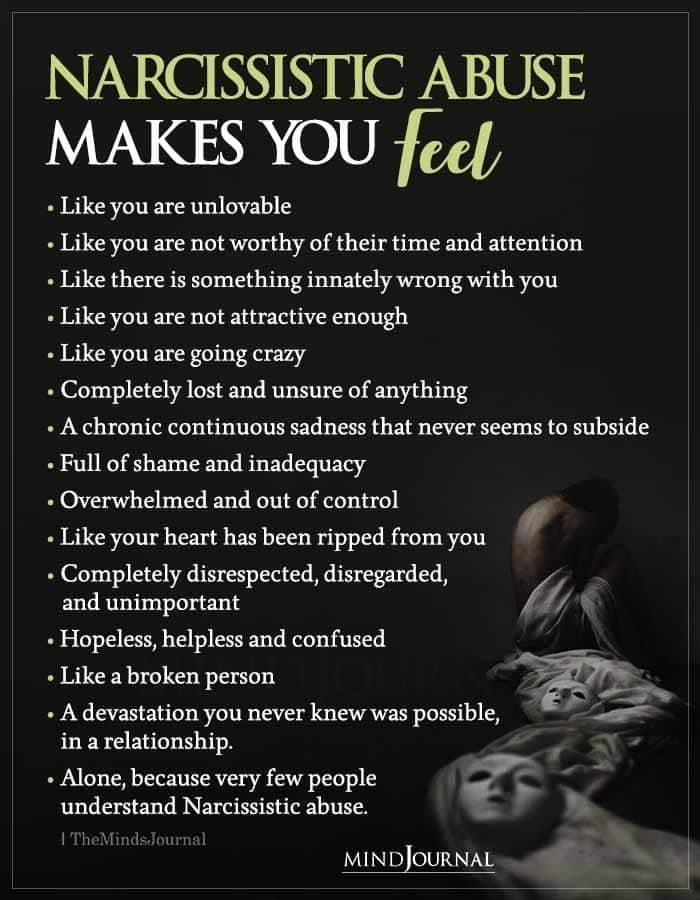
Most likely, you will not expect a stream of compliments from a hidden narcissist. Do not forget that such a person is looking for opportunities to maintain a sense of self-importance. So it's easy to see why it's hard for a closeted narcissist to compliment you. They usually don't show much appreciation for your talents and abilities - as a rule, narcissists don't appreciate them at all.
As with overt narcissists, in a relationship with a covert narcissist you will likely find that you do a lot of the hard emotional work. Although the covert narcissist may appear to be more emotionally open, it is most likely just a performance and is usually staged to take advantage of the other person and ultimately make them feel their own worthlessness, guilt, or shame.
Because one of the most common symptoms of narcissistic personality disorder is a lack of empathy, the covert narcissist will not be able to show a healthy emotional response in a relationship with a partner.
